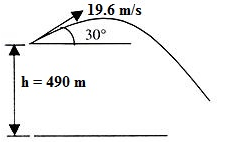Horizontal projection
A stone is thrown at a speed of 19.6 m/sec at an angle 30 degrees above the horizontal from a tower of height 490 meter. Find the time during which the stone will be in air.

The answer is 11.05.
This section requires Javascript.
You are seeing this because something didn't load right. We suggest you, (a) try
refreshing the page, (b) enabling javascript if it is disabled on your browser and,
finally, (c)
loading the
non-javascript version of this page
. We're sorry about the hassle.
2 solutions
Vertical motion (downward direction negative) :
Initial vertical velocity y = 19.6 sin 30o
Acceleration a = g = -9.8 m/s2
Vertical distance covered = h = 490 m
Using, h = ut + 1/2gt2
We have, 490 = - 9.8t + (1/2) 9.8t2
100 = - 2t + t2 or t2 - 2t - 100 = 0
t = \frac{2\pm \sqrt{(2^{2}-4\times 1\times \left [ -100 \right ])}}{2\times 1} =1+\sqrt{101}
t = 11.05 sec
I've done the LaTeX job for you. So you can correct your math typing by copy-pasting my codes!
Vertical motion (downward direction negative) : Initial vertical velocity y = 1 9 . 6 s i n 3 0 0 Acceleration a = g = − 9 . 8 m / s 2 Vertical distance covered = h = 4 9 0 m Using, h = u t + 2 1 g t 2 We have, 4 9 0 = − 9 . 8 t + 2 1 9 . 8 × t 2 1 0 0 = − 2 t + t 2 o r , t 2 − 2 t − 1 0 0 = 0 t = 2 × 1 2 ± ( 2 2 − 4 × 1 × [ − 1 0 0 ] ) = 1 + 1 0 1 t = 1 1 . 0 5 s e c
We can use the formula y = V o y t − 2 1 g t 2 where y = − 4 9 0 , V o y = sin 3 0 ∘ ( 1 9 . 6 ) and g = 9 . 8 1 .
Substitute:
− 4 9 0 = sin 3 0 ( 1 9 . 6 ) t − 2 1 ( 9 . 8 1 ) t 2
− 4 9 0 = 9 . 8 t − 4 . 9 0 5 t 2
4 . 9 0 5 t 2 − 9 . 8 t − 4 9 0
Use the quadratic formula to solve for t .
t = 2 a − b ± b 2 − 4 a c = 2 ( 4 . 9 0 5 ) 9 . 8 ± ( − 9 . 8 ) 2 − 4 ( 4 . 9 0 5 ) ( − 4 9 0 ) = 9 8 1 9 8 0 ± 9 . 8 1 9 7 0 9 . 8 4 ≈ 1 1 . 0 4 3 6 8 2 seconds